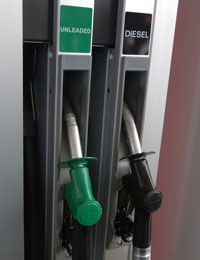Fuel Economy Tips When City Driving

City driving can be a huge part of a road trip abroad, especially if you’ve set aside time to really explore the cities and all they have to offer. For many people, city driving brings with it it’s own set of problems – especially how heavy it can be on fuel consumption. With ever increasing fuel prices it’s becoming more expensive to enjoy driving around cities, so it’s important to recognise some essential tips to reduce your fuel costs and create better fuel efficiency for your vehicle.
Driving Styles and Fuel Economy
It is common sense that driving in a city requires you to be alert and using defensive driving techniques as much as possible. If you’re an aggressive driver, it’s not only dangerous, but can actually lead to less fuel economy for you overall. Constantly breaking too hard at lights, speeding up to overtake at every opportunity and driving in a fast paced manner means that you’re using up more fuel than is necessary. Simply take your time and slow down a little. Driving over the speed limit decreases your fuel economy and matching the speed limit on city streets means you’ll actually get more green lights and will be able to cruise through easily.
Car Tips to Improve Your Fuel Economy
Keeping your car well maintained can help with your fuel economy for city driving. Check your tyres are always inflated to the correct pressure and make sure your spark plugs (if applicable), air filter and fuel filter are clean. These can save you a lot on fuel, especially in city driving where you tend to chew up fuel more quickly. You should also remove any non-essential weight from the car – roof racks, items in the boot etc. as this will help your fuel economy. Heavier cars obviously use more petrol to get moving, so dump anything you don’t need.
High Gears and Cruise Control
One of the main reasons that city driving uses up so much fuel is because you’re stopping and starting a lot. Starting your car requires the lowest gear possible, which is actually the most powerful. This means that using low gears uses the most power and thus requires the most fuel. Where possible, drive in a higher gear – but don’t speed to achieve this. In city driving, try not to ‘rev’ your car up as high as you can before changing gears as this will mean more fuel is used. Simply move through the gears smoothly until you’re in a comfortable gear for the road, normally 3rd or 4th gear in the city.Likewise, using cruise control in the city isn’t always the best idea. Although cruise control generally does reduce fuel consumption, it is mainly for highways and motorways. Most cars won’t let you engage cruise control until you’re at a certain speed anyway, so leave it for longer journeys that don’t require moving around obstacles, hills and other hazards.
Idling and Fuel Economy
In the UK, it’s now illegal to idle when waiting for someone at the side of the road. You should always switch off your engine if you’re planning to be stationary for a lengthy period of time. This means that if you’re waiting in a drive-thru line, waiting on your kids from school, or if you’re abroad and waiting on passengers, switch off your engine. It will not only protect the environment, but will also save you on fuel. It’s far more economical to have the engine off that have it idling as you wait.
Ventilation in Your Car
Many people when travelling abroad will be so overwhelmed by the heat and having air con in the car that they’ll run it constantly. This isn’t a problem if you’re driving long roads over great distances, but in the city, it’s actually more fuel efficient to simply open your windows. You won’t be travelling fast enough for the air blowing through the windows to add drag to your car, so you can save fuel by not running the air con.
Essential City Driving Tips
- Lighten your load
- Open the windows instead of relying on air con
- Don’t idle, switch off your engine when stationary
- Drive in the highest gear possible for the situation
- Check your car and ensure it’s well maintained
 Add to del.icio.us
Add to del.icio.us